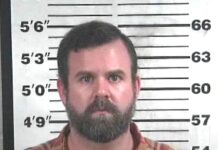HANCEVIILLE – In July of 2014, Gov. Robert Bentley appointed industry leaders, educators and others to work on the Alabama Workforce Council. The council’s primary goal is to create a conversation between education and industry by advising and supporting the state Board of Education.
Assistant Director of Cullman Economic Development Agency, Dale Greer, was appointed to the workforce council by Bentley, and spoke at the Cullman Chamber’s quarterly held morning seminar, Biscuits & Business.
“Governor Bentley created this workforce on July 1 as a three year program,” Greer said.
“There are 36 members, and these members represent the largest companies in Alabama. Representatives from Mercedes Benz, Honda, Alabama Power, Air Bus [are a part of the group] and also include former state superintendents and state senators and more. It really is a strong group of people who have strong opinions.”
Greer went on to say that each person from their area came in with certain ideas, with the main concern that their needs weren’t being met.
“Each one came in with certain thought processes,” said Greer.
“And that was mainly because their workforce needs were not being met. They were not sure of how to get everything going, but they all universally said that ‘We’re not getting what we need from education’.”
According to Greer, those within the committee went to meetings with subcommittees to address the issues of individual groups, something he said was educational for everyone.
“It was an education process for us,” said Greer. “The four committees they assigned was just to address those issues of our group. Then we came back two months ago, and it was a general overview of what those committees did. It was eye opening to some of us, like me, I had been on the marketing side. We were all in our own cubbyholes, until we got the presentations from the others. After that, there was some fine tuning and then it was presented to the governor.”
Working with community colleges like Wallace State and others is essential to putting out a quality workforce in Alabama, Greer said.
“Right now it is all a 65 page report,” said Greer. “It is also a work in progress. I think once it is all done, it will be very different.”
The report has not been released for public consumption as of yet, as there is still a lot of work to be done. One of the ideas that Greer said was presented was the creation of an educational database.
“The industry education and collaboration committee came up with the suggestion of creating a statewide database,” Greer said.
“They said that you have around eight agencies that are gathering that information, and that we could put it in one place and protect students by declassifying private information. They said it would provide insight on how Alabama is meeting education needs and workforce skills. They would like it operational by the fourth quarter of 2016.”
For Greer and his subcommittee, he stated that their focus was getting the word out about the benefits of working in industry, and how important a strong graduation rate was to the future of the workforce.
“Marketing and Promotion was the committee that I was on,” he said. “I think the task we have is one of the more difficult. We focused on telling kids and parents that there are great opportunities in industry. We talked about how there are careers there and they can make good money. What I think we are missing is the basic education side of things. We have 150,000 that do not have a high school equivalent education. So we are working to get the graduation rate to 90 percent by 2020.”
While there are many exciting industry leaps and tremendous job growth happening in Cullman, Greer has shown that there is still much work to be done.
The current workforce in Alabama as a whole is simply not yet on par with the demand, but Greer stated that this council has offered the opportunity to learn and grow to make the changes that are necessary.
“This has been a better learning experience that any of us have ever anticipated,” Greer said.
For more information on this work, contact Dale Greer at daleg@cullmaneda.org.




















